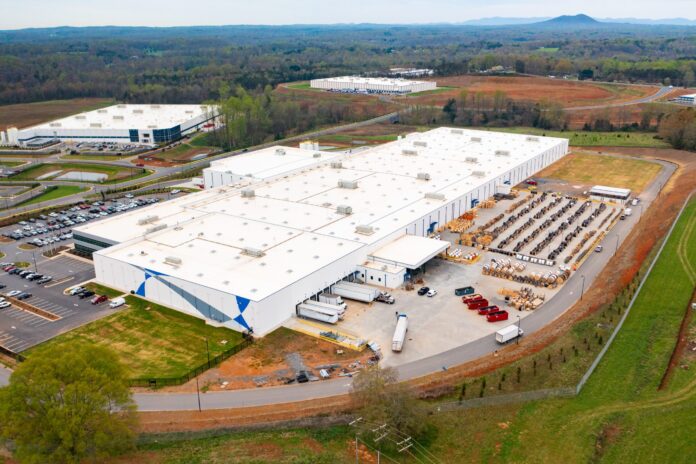Hickory, NC factory is the company’s most recent capacity expansion; Corning also has a supply agreement for rural operators
Corning has officially opened its new fiber cable facility in Hickory, North Carolina, which will significantly expand the company’s capacity to provide fiber for broadband deployment.
The Trivium campus facility consists of two large buildings, with the first building already fully active for production and delivering fiber cable to customers; production in the second building will be ramped up over the next quarter or so, according to Mike Bell, SVP and GM of Corning’s optical communications business.
“This is the latest of a series of investments that we have made totaling over half a billion dollars since 2020 and nearly doubling our ability to serve the fiberoptic cable market,” Bell said. “That’s been a constraint in the past, and we’re trying to make sure that is a thing of the past.”
The new facility produces fiber cable: Bringing together strands of optical fiber in various counts in a protective sheath, for use in indoor or outdoor deployment, with up to 6,912 fiber strands for high-capacity internal data center links. The company’s largest strander, which can put those 6,912 fibers into a single sheath, resides at the new location.
“When a lot of people say, ‘I need fiber,’ they mean ‘I need fiber cable,'” Bell explains. “There’s plenty of fiber made here in the United States to meet all the needs and more so. .. It’s the cable itself that has been the constraint.”
Between the new Hickory fiber cable facility and another one that will come online in Arizona next year, Bell says that as the federal funding for broadband translates to actual deployment projects in the next few years, “all this capacity will be online just in time to meet that.”
The Hickory fiber cable facility adds about 400 jobs to the 5,000 which Corning already has in the state, where it has manufactured optical fiber and cable for more than 40 years with a headquarters in Charlotte. The company manufactures optical fiber in Concord and Wilmington, and then that fiber is made into various fiber-counts of fiber cable in Newton, Winston-Salem, and now Hickory.
On-hand to help mark the official opening of the facility were federal representatives, including U.S. Commerce Secretary Gina Raimondo, as well as North Carolina Governor Roy Cooper and representatives from smaller, rural telecom players, including NCTA-The Rural Broadband Association, which worked out a supply agreement for its members with Corning earlier this year.
While large telecom companies can strike multi-year agreements with infrastructure suppliers and somewhat shield themselves from shortages or rising prices, smaller network operators, with correspondingly smaller budgets, often have to order materials and equipment on a just-in-time basis. That means in a supply crunch, they face higher hurdles in obtaining the necessary infrastructure—like fiber cable—in a timely and affordable fashion.
“We have heard loud and clear from our members about the problems in the telecommunications and broadband supply chain,” wrote Shirley Bloomfield, CEO of NCTA, in a blog post earlier this year announcing the fiber supply arrangement with Corning, via which the roughly 850 NCTA members could access 46.3 million feet in fiber cable and other connectivity products from Corning on a first-come, first-served basis. “Delivering reliable, high-speed internet access to rural Americans is of paramount importance. We hope … Corning will help our members meet their supply needs and simplify their network deployment at a critical time for our country.”

